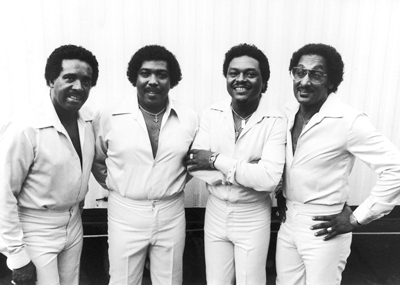
It was one of those transcendent musical moments, the kind of look-at-that collaboration only a Grammy Awards telecast can produce. There was Oscar-winning actor Jamie Foxx, R&B legend Smokey Robinson, sizzling Year of the Gentleman rapper-songwriter Ne-Yo, and Four Tops pioneer Abdul “Duke” Fakir, displaying flashes of classic Motown choreography while singing a medley of the Four Tops’ greatest hits.
That February performance was even more re-markable than the audience realized. “What probably was the most different part about that set was the four of us never practiced together until just before going onstage,” Fakir (pronounced Fah-KEER) reveals. “There was always a stand-in. One day Smokey wouldn’t be there, most days Jamie wasn’t there, a couple of days Ne-Yo couldn’t make it. But those guys were very anxious to do it, they were honoring the Four Tops that they wanted to do it, and when we were ready to go out, I said: ‘You guys are such pros; all we’re going to do is have fun. And I’ll bet you it’s going to come off.’ And it did. It was a joy.”
These were not the same old songs for two other reasons. This soul summit served to acknowledge the 50th anniversary year for Motown Records. And it celebrated a career milestone: the bestowing of a lifetime achievement Grammy to Detroit’s Four Tops for more than a half-century of unforgettable sounds.
“To me, that’s the highest award you can get in this business,” says Fakir, 73, who admits he “shed quite a few tears” behind his trademark designer eyeglasses when Grammy president Neil Portnow called him before Christmas with the announcement. “Now, all artists have a different value system. Some say the Rock and Roll Hall of Fame is the greatest. Some say it’s having your star on the Hollywood Walk of Fame (both of which the Four Tops achieved previously). I say this is the greatest, and I put it to you like this: We never received a Grammy. We were always beaten out by somebody. I remember when we had ‘I Can’t Help Myself,’ we were beaten out by [the Rolling Stones’] ‘Satisfaction.’
“So that was something that was always missing out of our career. To me, this is worth four or five Grammys because it sums up; it takes you from the beginning to the end of your career. The industry is saying, ‘You have done a fine job, we appreciate it, and thank you.’ That is the epitome. I’m on Cloud 10, man, and I haven’t come down.”
Yet his euphoria is tempered by bittersweet reality. With the death last October of Levi Stubbs, whose rugged, pleading lead baritone defined the group, Fakir is the sole surviving member of the quartet that met at a Detroit birthday party in 1953, began as the Four Aims, and signed with Berry Gordy’s Motown label 10 years later. In a span of more than four decades, until Lawrence Payton’s death from cancer in 1997, there were at least 15 Temptations, but only Four Tops. (Bass singer Renaldo “Obie” Benson died in 2005.) Fakir is the last Top standing.
“My three partners, who worked just as hard as I did and maybe harder in some cases, were there in spirit. I do believe that,” he says.
“I knew I would be very emotional because I would be speaking for them. Actually, when Levi passed, it was like all three of them came to me and said, ‘Now Duke, before you leave, you go and tell everybody thank you for all the things they’ve done for us.’ That’s how close we had always been and how close we will be. Sometimes I even feel guilty about being here when all of my real brothers have gone on. There’s a feeling like, ‘Why me, Lord, why me?’ And I think the answer is, because there’s still work for me to do. I am my brother’s keeper, and I think I am the one who can help strengthen the legacy. So that’s what I’ve been doing.”
That legacy has not been without controversy. Ebony Benson, Obie’s daughter, made public allegations earlier this year that Fakir was trying to deprive her family of the group’s royalties. “Well, those are just accusations, and believe me, they’re not true,” Fakir replies. “I’m not going to respond to them because that’s Obie’s daughter. She’s just very impatient. All the papers aren’t signed.”
However, Fakir continues to maintain the memory of the Tops — who now include Payton’s son Lawrence Payton Jr., former Motown solo artist Ronnie McNair, and ex-Temptation Theo Peoples — with a constant touring schedule that will bring them to DTE Music Theatre in June and the MotorCity Casino’s Sound Board in November. “We’re going to be home a lot this year, which is wonderful,” Fakir says. “And Berry’s planning a lot of things for Motown’s anniversary. And I think at the last minute he’ll tell everybody exactly what they are.”
|
|
|









